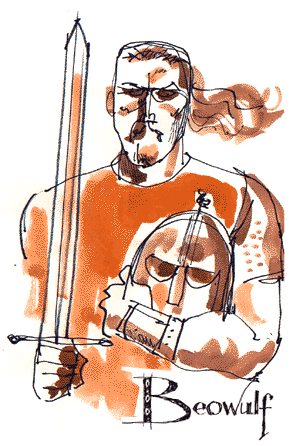
Terry Tang
In the passage we open up to where Hrothgar the protector of the Scyldings and King of the Danes finds out about the killing of Aeschere in the Heorot (the mead-hall). Aeschere is the elder brother of Yrmenlaf and is Hrothgar's right-hand man in giving him advice and also fighting alongside of Hrothgar during times of war. Hrothgar calls upon Beowulf (protagonist of the poem) who just the night before has finished killing Grendel (an evil monster).
Hrothgar tells Beowulf of Grendel's mother's revenge for killing Grendel. Hrothgar also talks about the physical features of both Grendel and his mother as he is talking to Beowulf. After Hrothgar's speech, he asks Beowulf to kill Grendel's mother and he will be rewarded with treasures. Towards the end we see Beowulf and his troop going to find Grendel's mother and seeing Aeschere's head hanging on top of the cliff there. Beowulf and his troop all get furious and Beowulf alone goes into where Grendel's mother is hiding under the earth. In the last paragraph we see Beowulf putting on his warrior armor such as his helmet made of gold surrounded by bands of rings so that no sword or any other weapon can break through it. There is also a sword that is given to him by Unferth who is the spokes person for Hrothgar.
Beowulf's comment to Hrothgar "sorrow not, wise mourn. Each of us must await his end of the world's life…" shows the representation of Christian and pagan ideas in the motivation of vengeance such as the attack on Grendel's mother and also her attacking the other people for revenge (Beowulf, p.25). The meaning of this quotation is that it is more honorable to take vengeance for someone's death than to do nothing about it. The passage also shows a Christian element in which Grendel's mother is described as a descendant from Cain (Old Testament) and it is merged into the idea of fate from the pagans. Hrothgar's statement "Ask not about pleasure. Sorrow is renewed to the people of the Danes…" shows that the Danes know how to sympathize for their own people and also know to seek revenge on those who put the pain upon them (Beowulf, p.24).
Arnold, Ralph. Beowulf: The Donaldson
Translation Backgrounds And Sources Criticisms. Ed. Joseph F. Tuso. New
York: W.W. Norton & Company. 90-94.site of picture found on picture